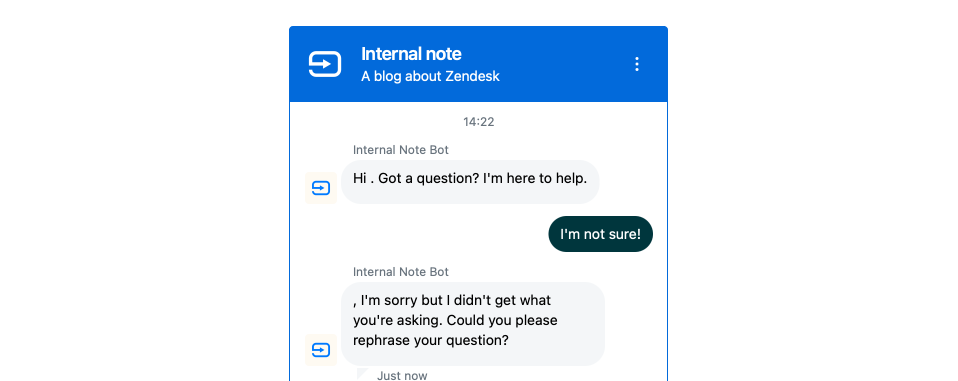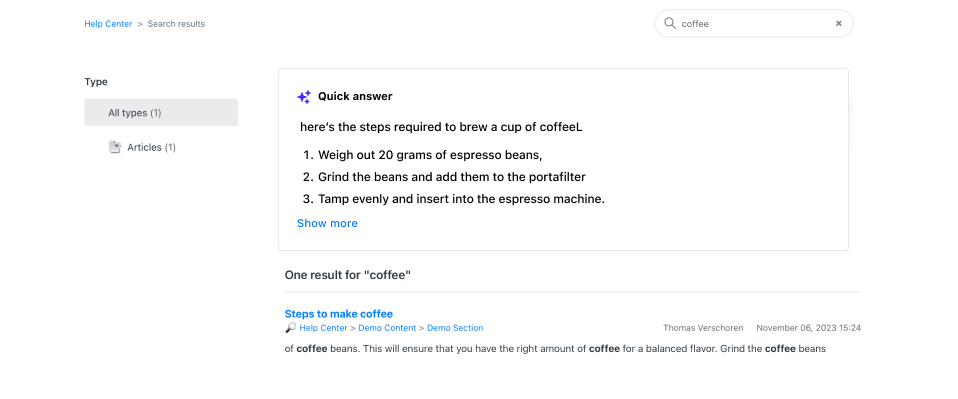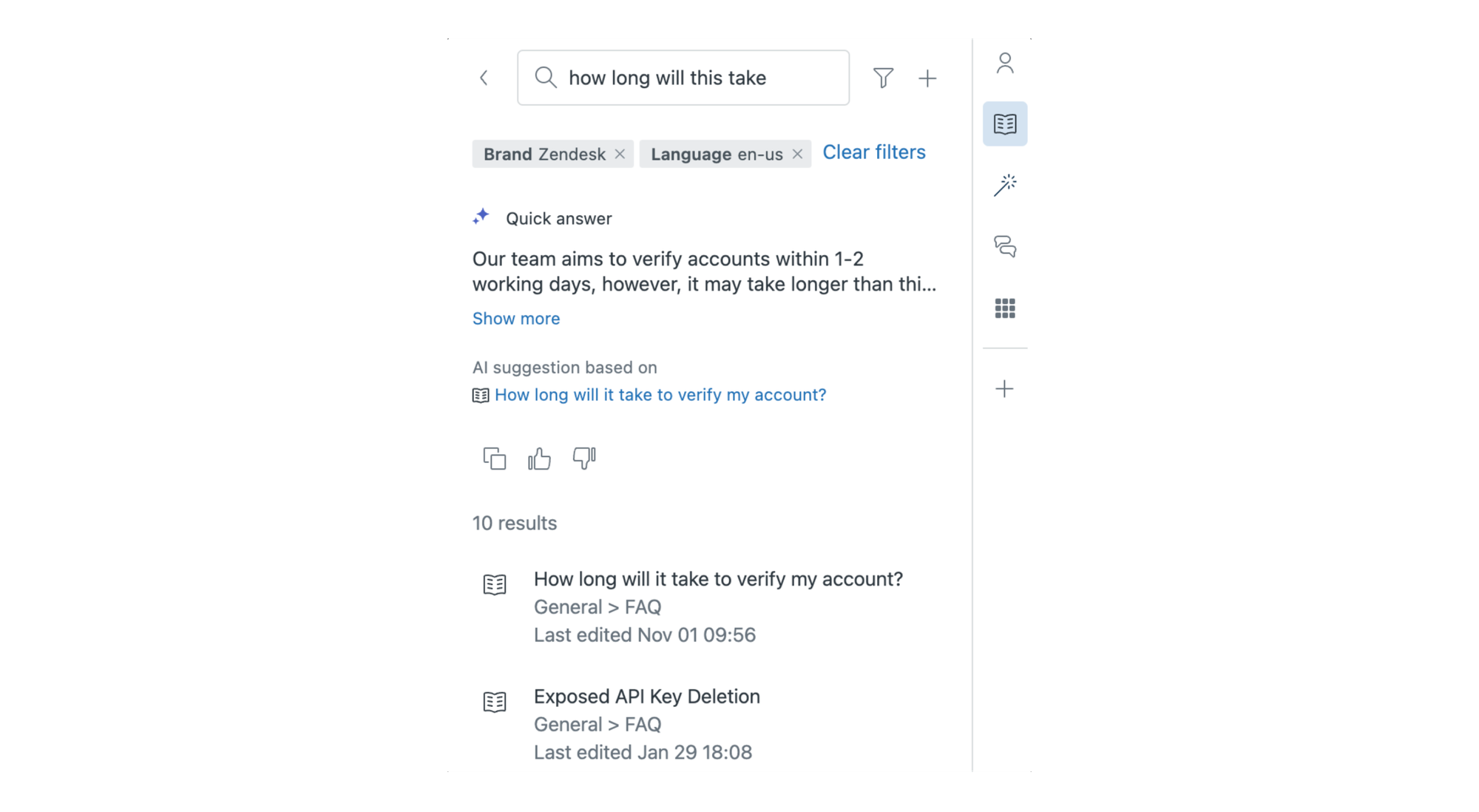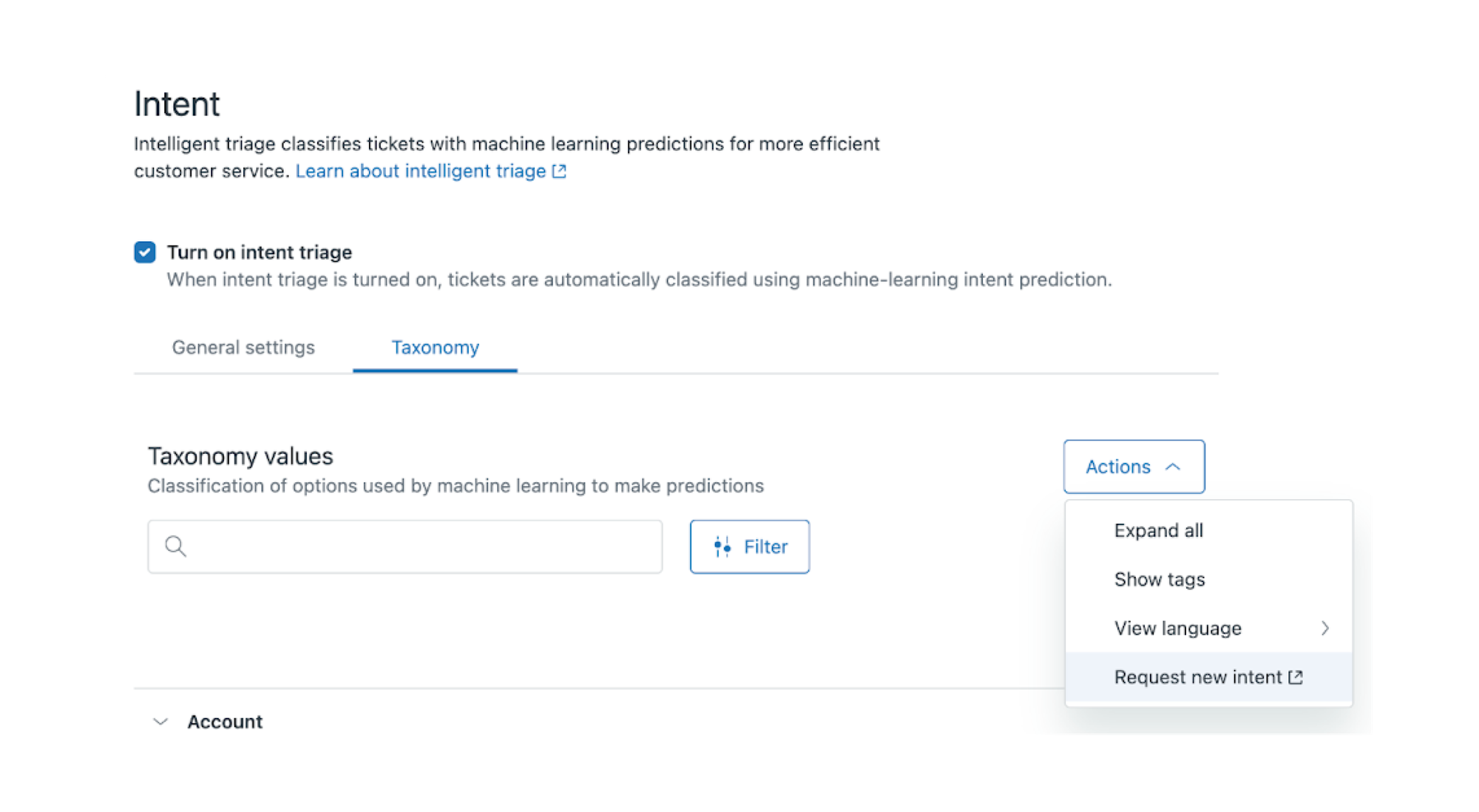
What's new from Zendesk Relate: AI Agents and Copilot.
Today was the first day of Relate, Zendesk's flagship event where they announce new features, give insights in customer and employee experience trends and showcase their products and customers. This article shows the new Agent Copilot and AI Agents.
Today was the first day of Relate, Zendesk's flagship event where they announce new features, give insights in customer and employee experience trends and showcase their products and customers. The day started with the Main Keynote, presented by Zendesk CEO Tom Eggemeier, SVP Marketing Lisa Kant and SVP Product, Paxton Cooper.

First on stage was Kelly Waldher, Zendesk's CMO introducing their new ad campaign, followed by Tom Eggemeier introducing the topic of today's keynote.
The customer is always human
Every customer interaction starts with a customer that reaches out. So even in a world where AI is everywhere, there's still at least one human involved in the interaction.
That could be a customer asking a question, an agent handling the request, or a manager reviewing quality. So when you're developing a platform that deeply integrates AI, that AI should still put the human first.
Speaking of AI, Tom put out three bold predictions. He thinks that by 2027 all interactions will somehow involve AI, that 80% of these will be resolved without an agent action, and that the end result will be a higher satisfaction score.

You might ask, if all these interactions are automated, what's left for agents? For one, while more tickets get automated, the amount of interactions will also steadily rise. And, the remaining tickets that agents handle are those tickets that are higher value work, less monotonous and highly rewarding. Agents will become managers of the AI. Its editor and supervisor.
Complete solution for the AI era

The most complete AI-powered CX solution with the launch of AI agents, AI copilot and new ways to tailor your AI
At the center of this new Zendesk is Zendesk AI, that powers AI agents, Agent copilot, Workflow automation, Assessment and Workforce Management, with manager insights via reporting, and build on a secure and trusted platform.

It's no surprise that Zendesk Bots were the first of three topics today. Last year's Relate launched Zendesk first foray into AI, and throughout the year they kept building on top of this initial release by launching improvements continuously.
Right before Relate, Zendesk announced the purchase of Ultimate, and the new AI Agents show a vision of how the integration of these two platforms will look.
AI Agents

First we had Answer Bot, then we got Zendesk Bot, and today we have.. Zendesk AI agents.
Zendesk AI agents are designed to work independent or alongside agent to resolve customer inquiries, or route them to the right agent with context. They act as a personal concierge, always on call.
To start, Zendesk announced a major shift in their strategy. Instead of selling the Zendesk Bot as part of an add-on, starting now , every Zendesk customer will get Zendesk Bot, or Zendesk AI Agents as they're called now, included in their Suite offering.
This also means that the Zendesk AI add-on is repositioned as tools to assist Agents in the Agent Workspace, helping with things like automations, summarization and tone shift.

By leveraging more powerful bot flows and a new AI dashboard with insights and metrics, Zendesk hoped to reach the goal of 80% of interactions to be automated or assisted by their bots.
From a product side, most of the changes available now were already available in EAP, but our now available to all users of Zendesk AI and bots: Generative replies which turns articles into personalized answers and Bot Persona, which allow you to tweak a bot's tone of voice.
The new insights dashboard is available as of today via the Admin Panel > Bots and includes a 7-day performance overview with metrics such as active users, amount of transferred tickets, and automated resolutions. The insights dashboard also has a conversation review feature to see the interactions that were or weren't automatically resolved.

Ultimate
Woven into this presentation were mentions of Ultimate and it seems Zendesk is shifting their entire Bot strategy towards an engine and platform build on top of Ultimate's technology, with the added benefit of having Zendesk's intents models as the basis to make sure that customers who start without any data or tickets do get immediate value. But I assume for the short term the bot we'll get is Zendesk's bot, and that throughout 2024 (and 2025) we'll see more and more of Ultimate's tech appear.
Agent copilot (patent pending)

The second major release today was the announcement of the Agent Copilot.
Where AI Agents are there to directly answer to customers and resolve as many inquiries as possible via self service or automated workflows, Agent Copilots are there to assist agents in their day-to-day job.
The Copilot lives right inside the ticket comment field and offers agents suggested responses or actions they'd want to execute on the ticket.

The demo showed for example a customer needed to upgrade their license to get things working again. The Copilot detected this intent, offered a variety of upgrade options to the customer (pulled in via API from another tool) and executed the upgrade, while proposing generated replies to the customer to the agent to approve or edit.
What's nice is that the agent can intercept the conversation at any time and add nuance to the Copilots' actions, like offering a discount by writing it down as a command for the Copilot ("add a 10% discount). The Copilot will learn this behavior and suggest the discount out of its own the next time.
The power of this solution is that it keeps the agent in control of the conversation and business process, but that the boring tasks like asking for an order number, executing a refund, updating the ticket fields all get automated, while they agent can focus on making sure it's the right steps to take.
For now, as with all major announcements Zendesk's makes, this Copilot is an EAP with a very limited scope. It'll only work for e-commerce companies that run on Shopify, but product managers on the show floor told me they want to this scale up quickly towards other industries (you need a good grasp of intents for this to work) or other platforms (if it has an API it should be connectable right?).

But the fact that it turns agents into supervisors or approvers of a digital copilot will have a major impact on not only the workload of existing agents, but also will make onboarding new agents on a team easier.
Instead of agents needing to learning all new processes and company tools, reading and copying replies from colleagues on similar tickets and validate their work with team leaders, they can now trust the actions of a trained copilot that has learned from the actions their more experiences colleagues, and jump right into the flow of tickets. Or at least, that's the promise the Agent copilot entails.
Workflow Automation

The final part of the AI product announcements was an overview of how the infusion of AI across the platforms allows for a more automated workflow across your CX (and EX) experience.
A customer that interacts with your company over any of available channels.
Zendesk's intelligent routing assigns the conversation to the AI Agent or human agent based on intent.
Once assigned to a human agent, the Agent Copilot jumps into action to handle as much of the conversation as possible, leaving the agent to supervise the ongoing interaction. And finally we can use intent reporting and the new staffing, and quality assessment features to get insights in how we can improve our CX experience and efficiency. (More on Zendesk WFM and QA in tomorrows newsletter)

Other releases
Aside from the main AI announcements on the stage, Zendesk also announced a slew of other improvements via announcements on the Zendesk Help Center.
Small Talk (EAP)
Zendesk Bots are very strict in that they only use knowledge available within your own Help Center. This means you, and your customers, can be sure that what the bot says comes from a trusted source, and chances of the bot hallucinating are small to non-existent.
The downside of such a narrow field of knowledge is that the bot is not very good in filling gaps in the conversation. If a customer says "Good Morning", or assumes they're talking to an agent and asks "How are you", or reacts with "I'm not sure", the bot will currently react with a "I'm sorry, but I don't get what you're asking..".
With the announcement of the new small talk EAP, this behavior is now changed and the bot can react in a more context-aware way with phrases like "Good day to you to!", "I'm fine thank you" or "If you're not sure, ...". The bot will still only reply to actual inquiries with your Help Center content, but can act more "human" in other scenarios.

Generative Search EAP in Agent Workspace and Help Center (EAP)
Not every support interaction happens within the Zendesk Widget or over social channels. Many customer will still Google a problem, or go to your Help Center to find a solution for their issue.
Similar to how the Generative Reply for the Bot will turn an article into a short answer, the new Quick Answer feature for the Help Center will put a generated solution for the customers' question above the search results on the Help Center. Since this feature is part of the Help Center theme, Zendesk also made this available for custom themes adding a new {{generative_answers}} placeholder to the theming templates capabilities. (Can’t wait to test this and see how customizable the design will be, stay tuned!).
In a nice twist, where the Bot only takes Knowledge Base articles into account, the Quick answers in the Help Center also use content added via Federated Search.

Additionally this feature also becomes available Agents in Agents Workspace too, with a nice upgrade to the Knowledge Panel. When an agent searches for information while working on a ticket, a summarized answer is displayed above the search results. Agents can then copy those answers into their comments.

Custom Intents
One major feature, and one that was both one of the major limitations and biggest differentiators between Zendesk and Ultimate, was Zendesk's lack of customization when it comes to the modal and intents the platform uses. Zendesk AI was released with a limited set of supported industries (retail, tech, finance) and grew the last year to support HR, Hospitality, IT and travel sectors.
If you matched one of the industries you got the benefit that Zendesk AI worked right out of the box without custom training requirements. However, if your industry didn't match, or if your use cases were so unique that the default intents are a poor fit, Zendesk AI doesn't work as well. You'd need to move to Ultimate with its ability to generate custom models and intents if you want to get the real benefits of AI.

Just before AI Zendesk announced the capability of adding custom intents to your models. It comes with a twist though. Instead of training a specific model for your instance on the fly to map tickets to the intent, you can request a new intent by submitting an intent description and sample tickets to Zendesk's data team. It's not really clear if intents get approved by default, what the wait time is and if that intents is unique to your instance or get aggregated into the industry models Zendesk provided across its customers.
For now I'd advise: if you need custom models to fit your needs, ask Ultimate for a demo. They're part of the Zendesk family and offer much more powerful capabilities that will better fit your needs.
Speaking of customization, another EAP that got announced was the ability to define custom entities Zendesk can detect in requests. Similar to how we can already detect credit cards or names for redaction, the system can recognize an order number in a customers' response and update a ticket field accordingly.
My take
Every movie trilogy has its beginning, middle and ending. The first episode creates the world, defines the guidelines and introduces us to our heroes and villains.
The second episode expands the world, allows our hero to grow while challenging their expectations and ends with a major cliffhanger that leaves us wanting for more.
And the final episode closes the story arc across all three movies, resolves open threads and allows our hero to triumph. But like any good ending, it also redefines the universe it's playing in.
The same can be applied to Zendesk AI's story arc. Relate 2023 introduced us Zendesk AI on the cusp of OpenAI's ChatGPT revolution. It redefined how the Zendesk Bot functions, added powerful capabilities for agents and showed us what's possible when you combine AI and CX.
Zendesk's AI event in October last year gave us an update that expanded the AI capabilities to Voice, added Similar and Mergeable tickets to the Agent Workspace and introduces Generative AI for the Zendesk Bot. I concluded my article on the event with:
Now, half a year later, this event feels like an Act II that adds a lot of missing pieces and makes the entire idea of an AI add-on worth while. The automated intent mapping combined with Generative AI makes it possible to empower an entire new Zendesk Bot experience that will change the way customers interact with your Self Service offerings.
That event delivered on the promises of the original Advanced AI add-on, and made it actually worthwhile to purchase, while still leaving some major items like custom models out of reach.
Today's keynote can be considered a Part 3 of our AI trilogy. It reshuffled Zendesk's AI offering. This event makes the Zendesk Bot capabilities available for all Zendesk Suite customers, showing the world that it's ready and that Zendesk is, in their words:

By turning the Advanced AI add-on in an Agent focussed set of features they give themself room to sell AI capabilities that integrate with Agent Workspace to users who need that kind of advanced workflows and insights. But they don't lock their most marketable features behind a paid add-on. By making the bot features part of Zendesk Suite they can differentiate themselves from competitors like Freshdesk or Salesforce and give value to their customers, while giving them a sample of what AI can do for CX, hopefully converting the customer to an Advanced AI customer in the process.
Similarly, I see a future where Zendesk turns Ultimate's custom models in an Enterprise feature, upgrading Zendesk's own pre-trained industry models with custom models for each Enterprise customer. This way they give these companies who probably need this kind of customization the most a fitting model for their types of inquiries and tickets, while conveniently turn Ultimate into a nice upsell reason towards Suite Enterprise
One thing I'm really excited about is the new Agent Copilot. It's still early days, and its capabilities are limited to generating replies and doing some basic actions in Shopify, but from what I've heard the idea is to allow any kind of integration by allowing developers (someday) to create their own LLM prompts for the Copilot, while talking to their own platforms or APIs.
Exciting stuff!





